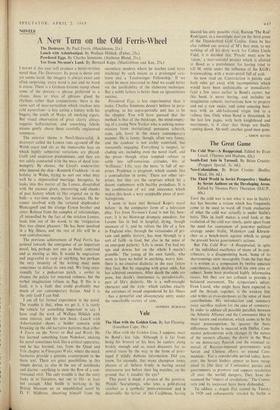THERE has been some shirty correspondence in
the serious dailies about the elaborate packing of shirts, complete with inven- tories of the number of pins, clips, stiffeners and what not. I have before me one such from a Spectator reader, who re- ports that with a 'Peter England Enkalon shirt costing 45s. 6d, he also bought one cardboard box, one sheet of tissue, two sheets of card (one of them one-eighth of an inch thick and weigh- ing half a pound), six pins, three plastic clips, two strips of card for stiffening the collar and two dummy cuff-links. (He would have been mightily cheered at the trade news of Mekay's first `pinless shirt fold.') He likes the shirt, but says that the collar and cuffs have been greatly over-stiffened.
This reminded me of the file of grumbles about men's shirts that I have accumulated over the years, and few of them are out of date. One concerns that age-old grouse about collar stiffeners. I have been shown a collection of odd- ments from a wardrobe of modest proportions that contained plastic stiffeners of every con- ceivable size and shape, strips from one and a half to two inches long and varying in width from one-eighth to three-eighths of an inch, some pointed, some rounded, and still others measur- ing almost an inch across, shaped to fit the corner of the collar. If these things are left in when a shirt goes to the laundry, they come back welded firmly to the cloth and sometimes broken and protruding in lumps. On occasions, the pointed stiffeners abrade the 'pocket' in the collar and drop out. The unhappy owner is then an obligatory member of the curly-collar brigade.
When the collar is stiffened by some such process as Trubenising, other troubles may follow, especially at laundries. If a rubberising process is used, the calendering or •ironing of the shirt at too high a temperature can melt and distort the stiffening and sometimes burn and discolour the outside of the collar. Instructions not to do this are often rubber-stamped into the collar- band, but these wash off and cannot be followed. lust as the pathetic injunction to the launderer to 'Wash as wool,' some synthetic blend cannot be relied upon, because few laundries take any notice and busy wives are liable to chuck a cottony shirt in with the rest of the wash. Simi- larly, those resin-impregnated 'drip-dries' do not long survive this rough-and-ready treatment and, by now, most wives are heartily sick of trying to iron 'minimum iron' shirts and hopefully send them to the laundry. This about halves their life.
Which? had a go at this in its first issue and sgain in June 1961, and found that cotton drip- lry shirts tended to weaken in the wash, to shrink and to discolour if they started life white. And it is unsafe to bleach them as the chlorine attacks the resin. Experience culled from wearers of this kind of shirt tends to show that quality has improved marginally in the last four years, but far from enough. A Toplin shirt, laundered a dozen times, shrank to the point where both Another song of the shirt that rings in my ears is that of the man who, refusing 'to become drip-dry or resort to separate stiff collars,' sends his expensive poplin and silk shirts to the laundry, but they always come back starched, which, he says, breaks the fibres and alters the appearance of them. His laundry told him he was too fussy and explained that they had to use coloured labour, 'many of whom had never seen collars before'—nor starch, presumably. He feels that a basic masculine right 'is in danger of being steam-rollered, steam-ironed and starched out of existence.'
Another Part of the Forest
By STRIX
NOBODY has taken any steps to rehabilitate the Grocer; we remember only G. K. Chesterton's arbi- trary attack upon his call- ing. The manufacturer of lethal weapons ('The Mer- chant of. Death') has, however, quite often been released, on parole, from the pillory in which, for Shaw, Auden and others, it was obligatory as well as fashionable to con- fine him; only a very few, rather dotty citizens will hustle their offspring away from the tele- vision whet, later this year, tributes are paid to the merchandise of death—like the Spitfire— which saved our nation a quarter of a century ago. I see, on the other hand, no end to the Land- lord's career as an Aunt Sally; and I am pain- fully aware that I, in my own twisted way, reinforce Mr. Crossman's prejudice against him.
The Rachman a Loamshire






































 Previous page
Previous page